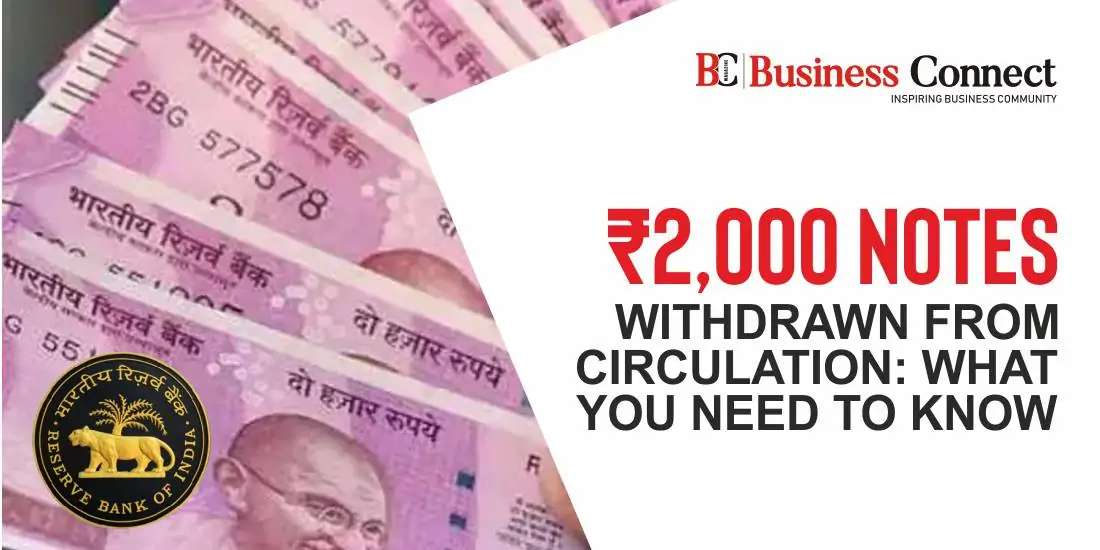Rs. 2,000 notes withdrawn from circulation: What You Need to Know
Written by Sanjay Kumar
The Reserve Bank of India (RBI) has made the decision to withdraw the Rs. 2000 denomination banknotes from circulation, while still maintaining their legal tender status. It has advised banks to stop issuing Rs. 2000 banknotes with immediate effect.
The introduction of the Rs.2000 banknote in November 2016, as authorized by Section 24(1) of the RBI Act, 1934, was primarily aimed at quickly fulfilling the currency requirements of the economy after the demonetization of all Rs. 500 and Rs. 1000 banknotes in circulation at that time.
According to sources quoted by news agency ANI, the ₹2000 currency note will continue to be considered legal tender even after September 30th. The RBI expects that the four-month period provided will be sufficient for people to exchange their notes with the banks. It is anticipated that the majority of the ₹2000 notes currently in circulation will be returned to banks within this timeframe. The RBI emphasizes that this is a routine measure and urges the public not to panic.
“The objective of introducing ₹2000 banknotes were met once banknotes in other denominations became available in adequate quantities,” RBI said in a statement.
“The printing of ₹2000 banknotes was halted in 2018-19. Approximately 89% of the ₹2000 denomination banknotes were issued prior to March 2017 and have reached their estimated lifespan of 4-5 years. The total value of these banknotes in circulation has decreased from ₹6.73 lakh crore at its peak on March 31, 2018 (37.3% of Notes in Circulation) to ₹3.62 lakh crore, constituting only 10.8% of Notes in Circulation as of March 31, 2023. Additionally, it has been observed that this denomination is not commonly used for transactions,” the statement further explained.
The RBI reassured that an adequate supply of banknotes in other denominations is available to meet the currency requirements of the public.
Considering the aforementioned factors and in line with the “Clean Note Policy” of the RBI, it has been decided to withdraw the ₹2000 denomination banknotes from circulation. However, the ₹2000 banknotes will remain legal tender. It should be noted that a similar withdrawal of notes from circulation was undertaken by the RBI in 2013-2014.
“Consequently, members of the public may deposit ₹2000 banknotes into their bank accounts and/or exchange them for banknotes of other denominations at any bank branch. Deposits into bank accounts can be made in the usual manner, without any restrictions, and subject to existing instructions and applicable statutory provisions,” stated the RBI.
To ensure operational convenience and minimize disruption to regular bank branch activities, the exchange of Rs. 2000 banknotes for banknotes of other denominations will be limited to Rs. 20,000/- at a time, starting from May 23, 2023.
Must Read:-
- Top 10 shoe brands in India for men & women 2023
- Top 10 Adorable Gifts for Your Special One
- Top 10 Countries with Maximum Indian Population as Citizens
- Top 10 Small Business Statistics You Need to Know For 2023
- Top 10 highest paid CEO in the World
- Top 10 richest person of India
- Top 10 Highest Paid CEOs of India
- Top 10 Most Selling Bikes and Scooters of 2022 in India
- The Success Story of Jeff Bezos
- Success Story Of Elon Musk
- Top 10 Business Newspaper In India
- Top 10 Tourist Places in India, places to visit after lockdown


